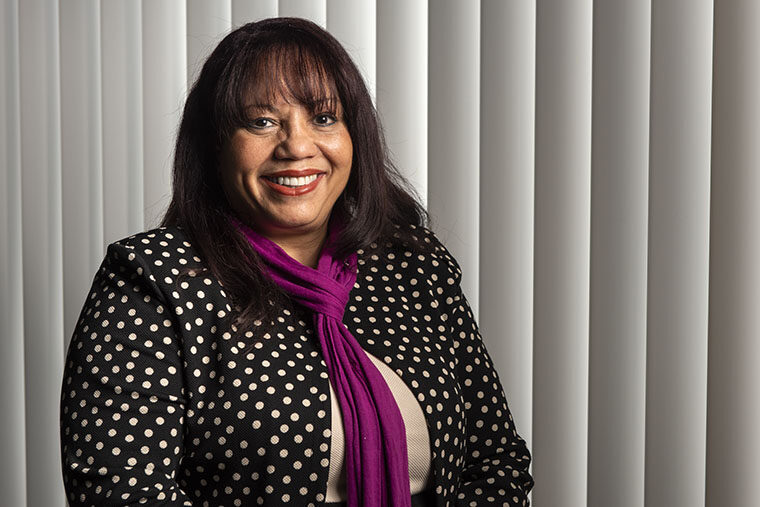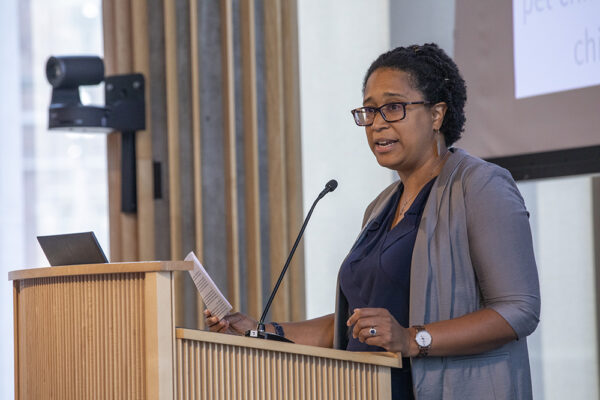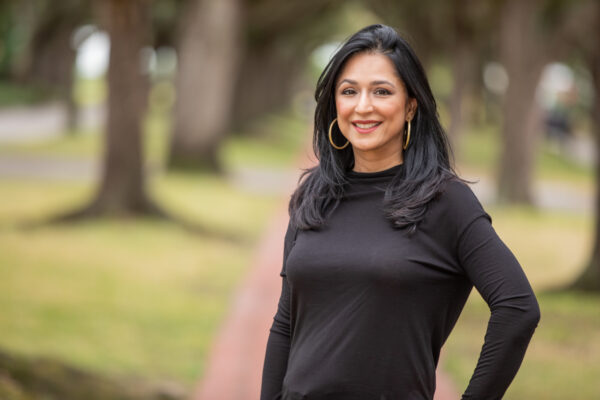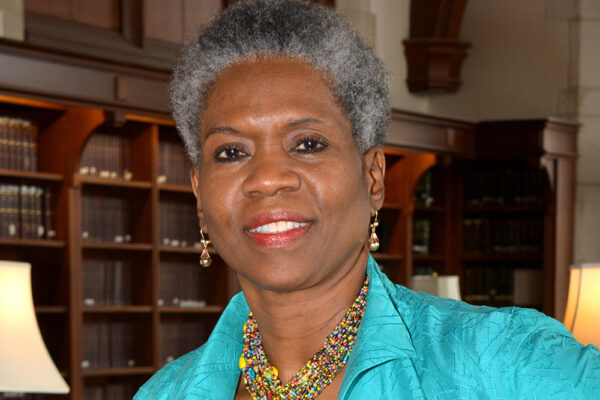“Never judge another person until you’ve walked a mile in their shoes.” Denise DeCou’s mother shared that old adage with her, and she has carried that perspective into her work as a diversity and inclusion leader at Washington University in St. Louis.
“We each have our own destiny. We don’t know where life takes us. You just don’t know someone else’s story,” said DeCou, manager of diversity and community outreach.
DeCou began her career at the university in September 2013 at the School of Medicine, one of two people hired as the first full-time employees at the school dedicated specifically to promoting diversity awareness. She previously had worked in the business world and for an architecture firm. After having children, she became a stay-at-home parent until she moved to St. Louis. Here, she worked at nonprofit organizations, including the United Way, before finding a position that closely matched her passion for working with diverse groups.
Charting a new course
During her early days at the university, DeCou worked alongside Daniel Blash, and both brought their own experiences and insights to their roles as diversity and inclusion leaders. The pair created a curriculum that addressed concerns from staff, faculty and students alike. Their work encompassed education, analytics, career planning, community outreach and evaluation.
However, at a research institution, it took more than emotion to bring everyone onboard. The two had to provide supporting data to confirm their work’s importance.
As DeCou and her colleagues facilitated discussions and trainings, they began to witness employees move from displaying disinterest in diversity and inclusion to being motivated to make a change. The trainings were specifically tailored for each department’s session.
“We worked hard at WashU to get people from that intellectual space into feeling something in the heart, and I think when you are able to do that, then you’re able to generate some sort of empathy.”
One event in particular challenged the university and the community at large to come together. The fatal shooting of Michael Brown by a Ferguson police officer in August 2014, and the unrest that followed, hit close to home. Faculty, students and staff needed safe spaces to process and express the impact of that event.
What resulted were five town-hall sessions on the Medical Campus that gave the campus community space to discuss the climate and move toward positive change. A universitywide dialogue and other events also were held on the Danforth Campus in response to the events in Ferguson.
“It was an important opportunity because you could feel the heaviness in the institution. Even in trainings, it was important to mention to people that we knew that there was this kind of cloud hanging over us and that people were feeling some kind of way,” DeCou said.
The university also responded by creating the Day of Discovery & Dialogue, which has become an annual two-day event featuring diversity-related panels, discussions and activities. DeCou continued to support this effort when she transitioned from the Medical Campus to the Danforth Campus in June 2015. She has served on the planning committee and also participated during a few sessions over the years. During this year’s program, she led a session titled “When You Feel Some Kind of Way: Developing Tools Across Differences.”
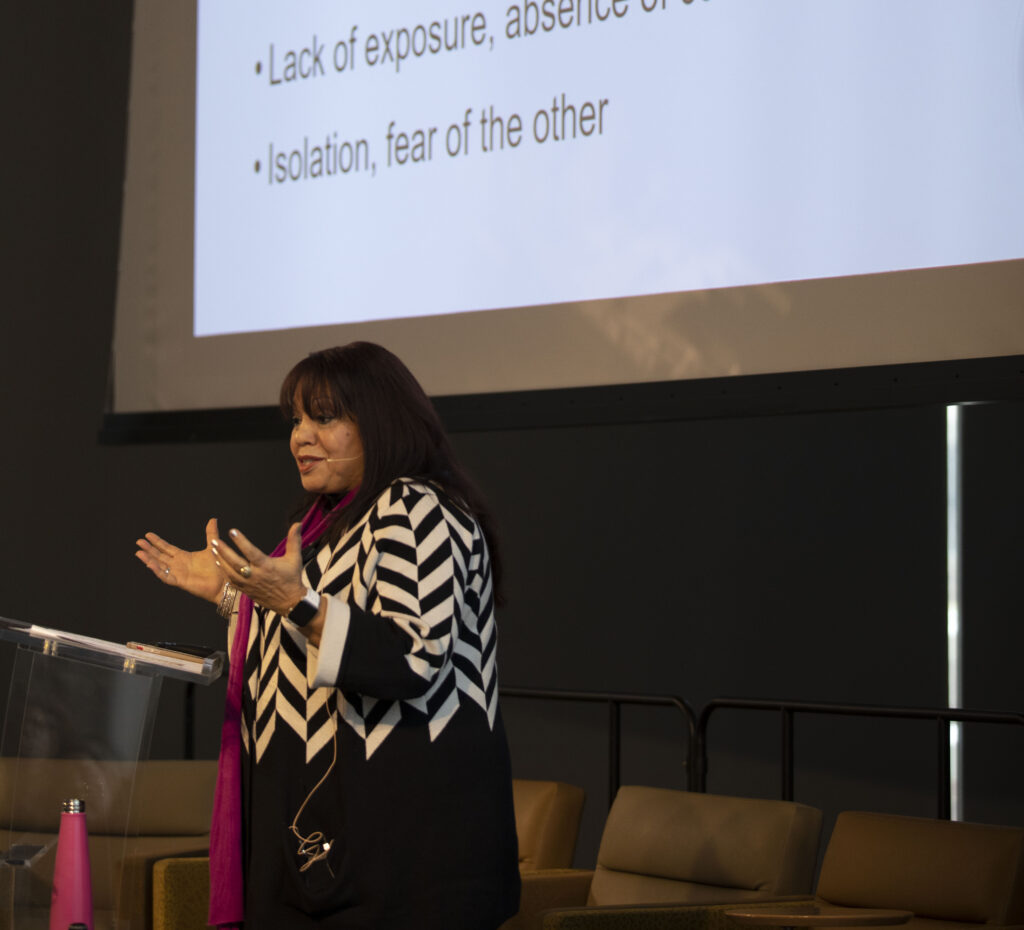
The session encouraged people to take a closer look at the biases we all innately hold. The discussion allowed members of the university to see themselves in others’ positions and to confront their personal biases.
“When you are not engaged in nor experience negative situations by virtue of any social identity that you hold, not having that experience allows you to not think about it, not have to worry about it. You don’t feel anything. It’s very easy to have blinders on, and really, our biases are what’s in our blind spots.”
This year’s Day of Discovery, Dialogue & Action introduced the “I am … ” Project, a learning opportunity that gave members of the university community a chance to highlight social identities. This interactive feature promoted the understanding that our social identities are our own and can change depending on how we change.
“The ‘I am … ‘ Project is important because it allows people to freely express who they are and for other people to take note of that and, hopefully, to be respectful of the identities that different people hold,” DeCou said. “I see it as a reminder that we are a multiplicity of identities and that we’re all in a space, looking to accomplish a set of goals that we created for ourselves and looking to WashU to be able to fulfill that.”
Respect starts at home
Perhaps DeCou’s respect for all people comes from her own experience. Her parents intentionally took the family to visit every state in the continental U.S. during her childhood. These experiences, and others, inspired DeCou’s appreciation for diverse cultures.
“You can be the brightest, most intelligent person, but if you have not left your bubble, whatever bubble you’re in, then you’re missing half of life’s experiences,” DeCou said.
She credits her parents as her biggest inspiration. Her mother, Shirley Roberts DeCou, was a homemaker and writer and illustrator of children’s books. Her father, George H. DeCou Jr., worked in the mailroom at IBM and took his job as seriously as someone in the corporate suite. His work ethic and commitment to excellence led to a regional manager position at corporate headquarters and, eventually, retirement after 26 years of service.
“He always wanted to be a director, so for me, my goal was always to be an executive director, but I just wanted to be able to do that to make him proud,” DeCou said.
A Brooklyn, N.Y., native, DeCou only intended to stay in St. Louis for a short time. However, her previous nonprofit work in the metro area opened her eyes and heart to the importance of the work that needed to be done here.
“It was my meetings with young African-American males, 16, 17 years old, that just really topped it for me. And I said, ‘I’ve seen some things, and I’ve heard enough things that if I move back to New York, I wouldn’t be able to sleep at night because there’s work to be done here.’ And so, I decided to stay.”
Dedicated to diversity
This commitment to the greater cause has carried over to her work at the university. For DeCou, diversity and inclusion are not just buzzwords — they are a part of who she is.
“I don’t think diversity and inclusion work is about rocket science. I think it’s about really looking into the things that we, as individuals, have learned growing up and along the way,” DeCou said. “Once out on your own, you have an opportunity to expand your boundaries and shake up those biases and look for ways to mitigate them.”
The university announced in February the launch of the Center for the Study of Race, Ethnicity & Equity, which is expected to begin its work in fall 2019. DeCou is hopeful that research from the center and others will inspire diversity and inclusion work long after the trainings are over.
“There have to be ongoing opportunities to engage people in discussion and learning, and it will help to keep people mindful of the thing that they did last year and the thing they learned the year before.”
The combination of passion and purpose can be seen throughout DeCou’s time at the university. Her understanding of her own social identities and acceptance of others’ has guided her career and life.
“I felt this is part of my destiny because of my lived experiences and background, that in doing this work, that I felt as though I’ve had a level of influence. It may just be because I’m just so passionate about it that it rubs off on other people.”
DeCou has certainly influenced the university’s culture. Just ask her colleague of many years, Monica Black Robinson, who works in Human Resources.
“Denise is the kind of person who sees your strengths and gives you the autonomy to discover and run with it. It’s sort of like she sees your red slippers and tells you, ‘You had the power all along, my dear,’” Robinson said. “I’ve known Denise for many years, and it has always been a pleasure to work with her because she’s the kind of leader who leads standing next to you.”
